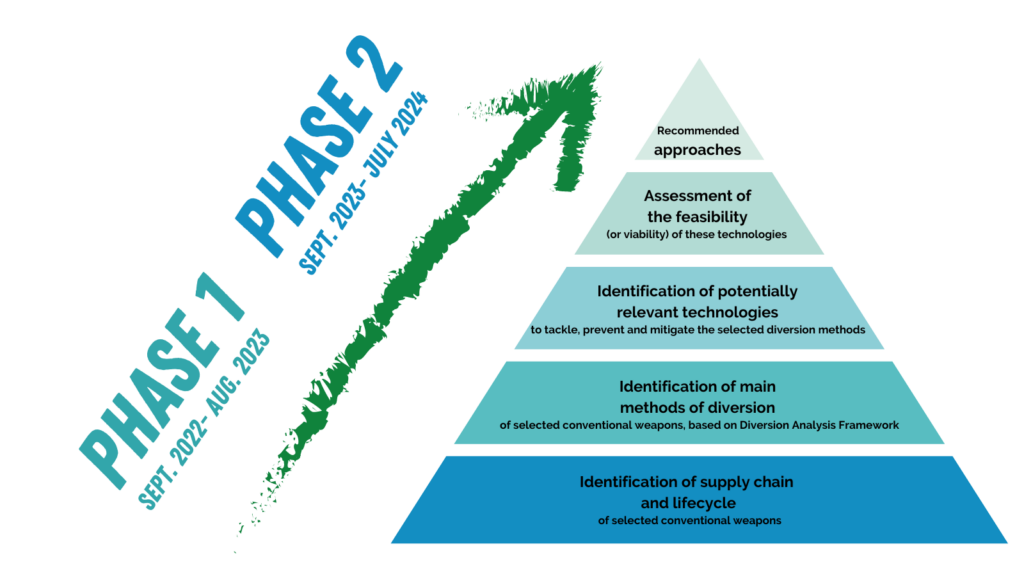Project D-TECT: countering the Diversion of arms using TEChnology Tools
Second paper
Based on a series of stakeholder engagements, this second Project D-TECT analysis by Sarah Grand-Clément (UNIDIR) examines the relevance and applicability of 14 technologies to support or strengthen efforts to counter the diversion of small arms and light weapons (SALW). The paper was presented during a side event at RevCon4 on 26 Juni 2024 at Room CR-B at UNHQ in New York and is available here.
Food-for-thought
In a first paper, the Flemish Peace Institute and UNIDIR seek to present a needs-driven, systematic, and context-sensitive framework to identify and assess technologies that could strengthen efforts to counter the diversion of conventional arms and related components.
Download the food-for-thought paper here.
This paper was presented during an event at ATT CSP 9 on August 24, 13:15 – 14:45 CET, Room F, CICG at the ATT CSP9 Conference venue in Geneva. Learn more about the event here.
Follow up on Project D-TECT
Do you wish to be kept informed about Project D-TECT?
Please fill in the form at the bottom of this page.
Rationale and goals of project D-TECT
Contrary to other industrial sectors, the use of technology to ensure the security of international arms transfers and prevent the diversion of conventional arms, their ammunition and parts and components, is comparatively under-utilised. Yet, technology solutions may improve the monitoring of arms flows and allow for better tracking and tracing of weapons or their components across their lifecycle.
Project D-TECT aims to:
- identify existing, mature technologies in other industrial sectors that can strengthen end use/r controls in the international arms trade and contribute to the prevention of diversion of conventional weapons during their lifecycle.
- develop a structured, stepwise, and bottom-up approach to assess the relevance of (mature) technologies to prevent, tackle or mitigate the diversion and unauthorized end-use of conventional military goods.
Scope, approach and methodology
Project D-TECT focuses on two specific types of conventional weapons: small arms and light weapons (SALW) and components of conventional weapons (CWC). With respect to the latter, the project will look at components of UAVs and at high-definition electronic components.
The project is made up of two consecutive phases:

Phase 1
Goal: Identify existing technologies applied in other industrial sectors that could be relevant to tackle diversion in the international arms trade.
Activities: Literature review and in-depth interviews, aimed to gather views from a varied set of experts. These have two main aims:
- delineate the material scope of the project and identify the main diversion methods through interviews with experts working on the diversion of SALW and CWC.
- identify technologies potentially relevant in tackling the selected methods of SALW and CWC diversion through interviews with experts in international supply chain management, tracking and tracing technologies, and representatives of industry sectors with a promising track record of tracking and tracing (chemical, food, postal services…).
Outcome: Food-for-thought paper which will include a long-list of potentially relevant technologies. These will be subject to an initial assessment by the study team, based on a set of criteria developed during the course of the first phase.
Phase 2
Goal: Substantiate, refine and validate the initial assessment of the identified technologies and to identify the preconditions regarding the practical feasibility for the implementation of these technologies in the international arms trade.
Activities: A set of international workshops with relevant state authorities, industry representatives and other stakeholders.
Outcome: Final report describing
(1) the general conceptual and methodological framework used to identify and assess relevant technologies to tackle and prevent diversion and unauthorized end-use of specific conventional military goods and
(2) the specific conclusions on the feasibility of specific technologies to tackle the selected methods of diversion for SALW and CWC, including recommendations emerging from the findings.
Do you wish to be kept informed about Project D-TECT?
Please fill in the form below.

